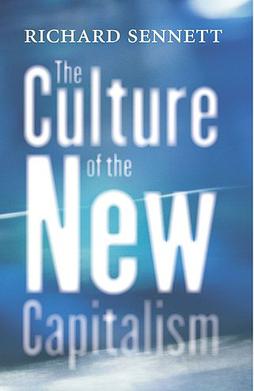Analysis
Based on the author's Castle Lectures at Yale, the book is a sociological study of the influence of the New Economy on human relationships. Sennett describes the transformations that have taken place in postmodern capitalism as corporations have become more diffuse, unstable, and decentered. Contrasted with the 'iron cage' bureaucracy described by Weber – those pyramid-like corporate structures in which individuals knew their place and planned their futures – modern corporations provide no long-term stability, benefits, social capital, or interpersonal trust.
Capitalism is an economic system based on the private ownership of the means of production and their operation for profit. Characteristics central to capitalism include private property, capital accumulation, wage labor, voluntary exchange, a price system, and competitive markets. In a capitalist market economy, decision-making and investment are determined by every owner of wealth, property or production ability in financial and capital markets, whereas prices and the distribution of goods and services are mainly determined by competition in goods and services markets.
Bureaucracy refers to both a body of non-elective government officials and an administrative policy-making group. Historically, a bureaucracy was a government administration managed by departments staffed with non-elected officials. Today, bureaucracy is the administrative system governing any large institution, whether publicly owned or privately owned. The public administration in many countries is an example of a bureaucracy, but so is the centralized hierarchical structure of a business firm.

Maximilian Karl Emil Weber was a German sociologist, philosopher, jurist, and political economist. His ideas profoundly influenced social theory and social research. Weber is often cited, with Émile Durkheim and Karl Marx, as among the three founders of sociology. Weber was a key proponent of methodological anti-positivism, arguing for the study of social action through interpretive means, based on understanding the purpose and meaning that individuals attach to their own actions. Unlike Durkheim, he did not believe in mono-causality and rather proposed that for any outcome there can be multiple causes.
Sennett first looks at bureaucracy in early capitalism. Most businesses were short lived and unstable. However, in the latter half of the 19th century, business was modelled on predictable military lines where all roles were defined and career progression could be mapped out. This new model aimed at social inclusion, that is, most would work at the base of the social pyramid, hopefully progressing to the tip.
Modern capitalism looks at this model with disdain – too many superfluous people are employed to remain competitive and people should constantly adapt and prove themselves to be assets. Therefore, in large modern businesses, the majority of workers face uncertainty and find it difficult to conceive of a life narrative. Due to mechanization and the need for upskilling, managers as well as their subordinates face the possibility of obsolescence. Concepts such as craftmanship and getting the job right are seen as wasteful and somewhat obsessive.

Mechanisation is the process of changing from working largely or exclusively by hand or with animals to doing that work with machinery. In an early engineering text a machine is defined as follows:
Every machine is constructed for the purpose of performing certain mechanical operations, each of which supposes the existence of two other things besides the machine in question, namely, a moving power, and an object subject to the operation, which may be termed the work to be done.
Machines, in fact, are interposed between the power and the work, for the purpose of adapting the one to the other.
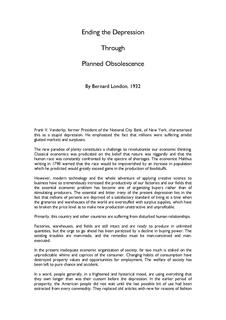
Obsolescence is the state of being which occurs when an object, service, or practice is no longer wanted even though it may still be in good working order; however, the international standard EN62402 Obsolescence Management - Application Guide defines Obsolescence as being the "transition from availability of products by the original manufacturer or supplier to unavailability". Obsolescence frequently occurs because a replacement has become available that has, in sum, more advantages compared to the disadvantages incurred by maintaining or repairing the original. Obsolete also refers to something that is already disused or discarded, or antiquated. Typically, obsolescence is preceded by a gradual decline in popularity.
Capitalism's need for potential is increasingly reflected in the education system. SATs favour superficial and adaptive reasoning rather than deeper introspection on the meaning of things. Finally, comparisons are made between branding and politics. Products such as cars are physically very similar, but branding creates differences on minor issues revolving around appearance and emotion. Sennett views this same 'goldplating' process as having a largely negative influence on modern politics where presentation is key.
The SAT is a standardized test widely used for college admissions in the United States. Since it was first debuted by the College Board in 1926, its name and scoring have changed several times; originally called the Scholastic Aptitude Test, it was later called the Scholastic Assessment Test, then the SAT I: Reasoning Test, then the SAT Reasoning Test, and now, simply the SAT.
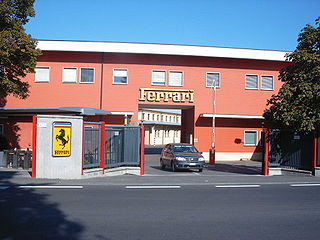
A brand is an overall experience of a customer that distinguishes an organization or product from its rivals in the eyes of the customer. Brands are used in business, marketing, and advertising. Name brands are sometimes distinguished from generic or store brands.
Politics refers to a set of activities associated with the governance of a country, or an area. It involves making decisions that apply to members of a group.

Joseph Aloïs Schumpeter was an Austrian political economist. Born in Moravia, he briefly served as Finance Minister of Austria in 1919. In 1932, he became a professor at Harvard University where he remained until the end of his career, eventually obtaining U.S. citizenship.
Social science is a category of academic disciplines, concerned with society and the relationships among individuals within a society. Social science as a whole has many branches. These social sciences include, but are not limited to: anthropology, archaeology, communication studies, economics, history, human geography, jurisprudence, linguistics, political science, psychology, public health, and sociology. The term is also sometimes used to refer specifically to the field of sociology, the original "science of society", established in the 19th century. For a more detailed list of sub-disciplines within the social sciences see: Outline of social science.
State capitalism is an economic system in which the state undertakes commercial economic activity and where the means of production are organized and managed as state-owned business enterprises, or where there is otherwise a dominance of corporatized government agencies or of publicly listed corporations in which the state has controlling shares. Marxist literature defines state capitalism as a social system combining capitalism with ownership or control by a state—by this definition, a state capitalist country is one where the government controls the economy and essentially acts like a single huge corporation, extracting the surplus value from the workforce in order to invest it in further production. This designation applies regardless of the political aims of the state and some people argue that the modern People's Republic of China constitutes a form of state capitalism and/or that the Soviet Union failed in its goal to establish socialism, but rather established state capitalism.

An organization or organisation is an entity comprising multiple people, such as an institution or an association, that has a particular purpose.
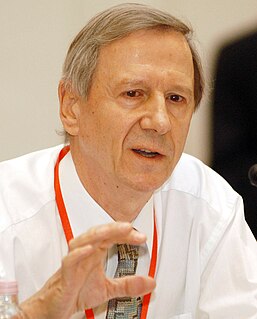
Anthony Giddens, Baron Giddens is a British sociologist who is known for his theory of structuration and his holistic view of modern societies. He is considered to be one of the most prominent modern sociologists, the author of at least 34 books, published in at least 29 languages, issuing on average more than one book every year. In 2007, Giddens was listed as the fifth most-referenced author of books in the humanities.

Environmental sociology is the study of interactions between societies and their natural environments. The field emphasizes the social factors that influence environmental resource management and cause environmental issues, the processes by which these environmental problems are socially constructed and defined as social issues, and societal responses to these problems.
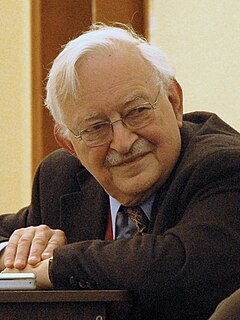
Immanuel Maurice Wallerstein is an American sociologist, historical social scientist, and world-systems analyst, arguably best known for his development of the general approach in sociology which led to the emergence of his world-systems approach. He publishes bimonthly syndicated commentaries on world affairs. He has been a Senior Research Scholar at Yale University since 2000.

Economic sociology is the study of the social cause and effect of various economic phenomena. The field can be broadly divided into a classical period and a contemporary one, known as "New economic sociology".
Institutional economics focuses on understanding the role of the evolutionary process and the role of institutions in shaping economic behaviour. Its original focus lay in Thorstein Veblen's instinct-oriented dichotomy between technology on the one side and the "ceremonial" sphere of society on the other. Its name and core elements trace back to a 1919 American Economic Review article by Walton H. Hamilton. Institutional economics emphasizes a broader study of institutions and views markets as a result of the complex interaction of these various institutions. The earlier tradition continues today as a leading heterodox approach to economics.

This is a chronological list of works by Max Weber. Original titles with dates of publication and translated titles are given when possible, then a list of works translated into English, with earliest-found date of translation. The list of translations is most likely incomplete.
The culture of capitalism or capitalist culture is the set of social practices, social norms, values and patterns of behavior that are attributed to the capitalist economic system in a capitalist society. Capitalist culture promotes the accumulation of capital and the sale of commodities, where individuals are primarily defined by their relationship to business and the market. The culture is composed of people who, behaving according to a set of learned rules, act as they must act in order to survive in capitalist societies.
Sociocultural evolution, sociocultural evolutionism or cultural evolution are theories of cultural and social evolution that describe how cultures and societies change over time. Whereas sociocultural development traces processes that tend to increase the complexity of a society or culture, sociocultural evolution also considers process that can lead to decreases in complexity (degeneration) or that can produce variation or proliferation without any seemingly significant changes in complexity (cladogenesis). Sociocultural evolution is "the process by which structural reorganization is affected through time, eventually producing a form or structure which is qualitatively different from the ancestral form".
Social threefolding is a sociological theory suggesting the progressive independence of society's economic, political and cultural institutions. It aims to foster human rights and equality in political life, freedom in cultural life, and associative cooperation in economic life. The idea was first proposed by Rudolf Steiner in the great cultural ferment immediately following the end of the First World War.
In sociology, the iron cage is a concept introduced by Max Weber to describe the increased rationalization inherent in social life, particularly in Western capitalist societies. The "iron cage" thus traps individuals in systems based purely on teleological efficiency, rational calculation and control. Weber also described the bureaucratization of social order as "the polar night of icy darkness".

Richard David Wolff is an American Marxian economist, well known for his work on Marxian economics, economic methodology, and class analysis. He is Professor Emeritus of Economics at the University of Massachusetts Amherst, and currently a Visiting Professor in the Graduate Program in International Affairs of the New School University in New York. Wolff has also taught economics at Yale University, City University of New York, University of Utah, University of Paris I (Sorbonne), and The Brecht Forum in New York City.
An economic ideology distinguishes itself from economic theory in being normative rather than just explanatory in its approach. It expresses a perspective on the way an economy should run and to what end, whereas the aim of economic theories is to create accurate explanatory models. However the two are closely interrelated as underlying economic ideology influences the methodology and theory employed in analysis. The diverse ideology and methodology of the 74 Nobel laureates in economics speaks to such interrelation.
Inclusive capitalism is a term composed of two complementary meanings: (1) poverty is a significant, systemic problem in countries which have already embraced or are transitioning towards capitalistic economies, and (2) companies and non-governmental organizations can sell goods and services to low-income people, which may lead to targeted poverty alleviation strategies, including improving people’s nutrition, health care, education, employment and environment, but not their political power.
The following outline is provided as an overview of and topical guide to society:
